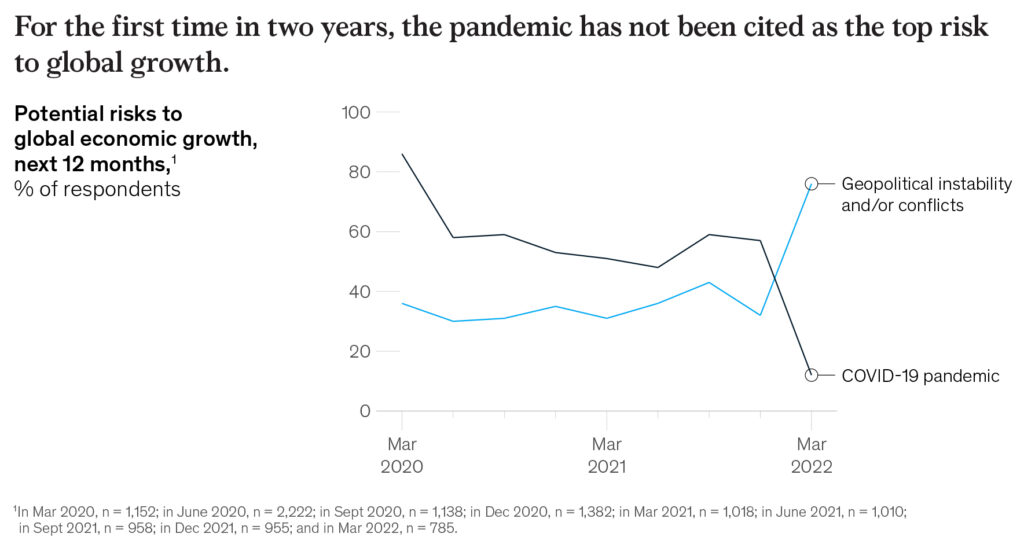Geopolitical instability and conflicts have become the greatest threat to global economic growth, yet when taking short-term decisions that are often vital for their organisations or that can have a significant human or financial impact, decision-makers find it difficult to anticipate political risks and sometimes even ignore them. In an increasingly uncertain international context, developing the ability and the mental habit of evaluating and responding to multiple (political) risks in a forward-looking approach circumventing cognitive biases is now essential for managers and the long-term profitability of their activities.

Lorenzo Coronati
Attorney and Global Executive PhD candidate

Frédéric Jallat
Professor of Marketing at ESCP Business School
As part of their job, leaders in organisations (CEOs, policy-makers and more broadly anyone who oversees a process of social influence to maximize the efforts of other stakeholders for a given purpose) have to make important decisions, to anticipate opportunities offered by the business world on the one hand and the challenges on the other. Every decision they make in a turbulent or volatile environment such as the one we now live in, involves a degree of political risk-taking.
Despite the importance of this phenomenon, leaders tend to ignore it until it leads to a crisis for their organisation, and most do not incorporate meticulous political analyses in their risk management and international approaches. And yet, developing the ability to identify, assess and respond to risks is now an essential skill for managers and their organisations’ adaptation and resilience in the face of uncertainty and crisis.
Despite the fact that both the Covid-19 pandemic and inflation remain major concerns among executives and political decision-makers, according to the latest McKinsey Global Survey on economic conditions geopolitical instability and/or conflicts are now considered the greatest threat to global economic growth.

Similarly, experts and leaders interviewed during the World Economic Forum in Davos, Switzerland, named geopolitical risks and global warming’s impact on the energy sector (up to 8.5 million jobs in the fossil and nuclear energy sectors will disappear by 2050) as two of the main drivers of global imbalance.
This shows that understanding political risk is the key to any successful initiative. Still, corporations spend a lot more time and money managing financial and operational risks than dealing with the identification and assessment of political risks – including in unstable, corrupt and even criminogenic environments.
Recent events show that decision-makers tend to ignore political risk until it occurs in an acute and irreversible way (think of the way Renault or McDonald’s left Russia, for example). This systematic underestimation lies in the multifaceted and constantly evolving nature of political risk that challenges decision-making in today’s complex environments.
Procrastination, denial and prejudice
In the impact paper we wrote as part of ESCP Business School’s “Geopolitics and Global Business Impact” series, we identified two main reasons for leaders’ lack of political (geo)foresight:
- One is more emotional and irrational, where systematic deviations from cognitive rationality in people’s judgment and decision-making – designated by psychologists and academics as ‘heuristics and biases’ – play crucial roles in risk recognition while approaching international business.
Procrastination, denial, (cognitive) laziness and prejudice are often more important than rational, well-founded, evidence-based judgement in recognising and managing geopolitical risks.
Made up of preconceived ideas, these mental constraints make it difficult for managers to objectively anticipate or recognise future damage (even when it is already happening), not allowing them to prevent and mitigate the disastrous consequences of international crises for their company. Our actions are less designed by the quality of our analysis than by simple inner factors such as perspectives, experiences and often, self-interest.
Heuristics and biases are an architecture of assumptions that can help our mental discomfort maintain a balance in our behaviours and prevent the psychological difficulty of cognitive dissonance, i.e., a feeling of cognitive pain that occurs when there are conflicting thoughts, beliefs, or behaviours. Both support and give balance to our ideas and decisions, even when there is a mental conflict in us during the elaboration of a decision-making process founded on destructive beliefs or truths. It is the triumph of ideology over data and expertise, or hasty actions over analytic reflection.
- The other is elusive and intangible, since it is built by the political risk ambiguity as an exogenous and extraneous element in a company’s life. It is expressed in the difficulty of understanding the peril of an emerging risk due to its unpredictable appearance in a globalised world. Occurrences with a local distribution are unknown and unimaginable because the trigger might be unleashed in another part of the world.
This information asymmetry creates a vulnerability in the leader’s threat identification process. Decision-makers find it difficult to identify something random, both temporally and logistically distant, and not programmable by pre-existing evidence, having an elusive form and an imponderable timing frequency.
These features make it hard for leaders to process decisions with events that happen infrequently and without familiar signals. There is a fallacy in the tendency to handle political risk as a typical event with associated costs because it is not always straightforward, rational, or predictable.
Managing these events requires greater anticipation and systematic, programmed monitoring, following the example of Pierre Wack who, using scenario analysis, was the first to develop a systematic planning and forecasting methodology at Royal Dutch Shell’s headquarters in London. Thanks to his analyses, the Anglo-Dutch oil giant was able to anticipate two major oil shocks in less than a decade.
The problem is that such a process is liable to be isolated in minds. This approach harms organisations. Spotting risks needs to be a gradual and collective mental process. It is essential to lead and orchestrate the interactions of the elements informing the process, developing a synergy between risk perception and detection.
Leaders should learn to explore more hypotheses, use forward-looking methodologies more systematically and train themselves to improve their personal awareness of possible disturbances or problems.
We mean neither to outline ways of eliminating cognitive biases, unfounded heuristics or prejudices, nor to formulate a uniform political risk construct. It is simply impossible.
However, leaders should learn to explore more hypotheses, use forward-looking methodologies (game theory, systemic approaches, analysis of weak signals, etc.) more systematically and train themselves to improve their personal awareness of possible disturbances or problems.
Developing this skill in a more assertive way would make it possible to mitigate a number of unforeseen, deleterious, costly consequences, potentially prohibitive for the future of companies’ international development.
This article was originally published in French by newspaper Le Monde.
License and Republishing
The Choice - Republishing rules
We publish under a Creative Commons license with the following characteristics Attribution/Sharealike.
- You may not make any changes to the articles published on our site, except for dates, locations (according to the news, if necessary), and your editorial policy. The content must be reproduced and represented by the licensee as published by The Choice, without any cuts, additions, insertions, reductions, alterations or any other modifications.If changes are planned in the text, they must be made in agreement with the author before publication.
- Please make sure to cite the authors of the articles, ideally at the beginning of your republication.
- It is mandatory to cite The Choice and include a link to its homepage or the URL of thearticle. Insertion of The Choice’s logo is highly recommended.
- The sale of our articles in a separate way, in their entirety or in extracts, is not allowed , but you can publish them on pages including advertisements.
- Please request permission before republishing any of the images or pictures contained in our articles. Some of them are not available for republishing without authorization and payment. Please check the terms available in the image caption. However, it is possible to remove images or pictures used by The Choice or replace them with your own.
- Systematic and/or complete republication of the articles and content available on The Choice is prohibited.
- Republishing The Choice articles on a site whose access is entirely available by payment or by subscription is prohibited.
- For websites where access to digital content is restricted by a paywall, republication of The Choice articles, in their entirety, must be on the open access portion of those sites.
- The Choice reserves the right to enter into separate written agreements for the republication of its articles, under the non-exclusive Creative Commons licenses and with the permission of the authors. Please contact The Choice if you are interested at contact@the-choice.org.
Individual cases
Extracts: It is recommended that after republishing the first few lines or a paragraph of an article, you indicate "The entire article is available on ESCP’s media, The Choice" with a link to the article.
Citations: Citations of articles written by authors from The Choice should include a link to the URL of the authors’ article.
Translations: Translations may be considered modifications under The Choice's Creative Commons license, therefore these are not permitted without the approval of the article's author.
Modifications: Modifications are not permitted under the Creative Commons license of The Choice. However, authors may be contacted for authorization, prior to any publication, where a modification is planned. Without express consent, The Choice is not bound by any changes made to its content when republished.
Authorized connections / copyright assignment forms: Their use is not necessary as long as the republishing rules of this article are respected.
Print: The Choice articles can be republished according to the rules mentioned above, without the need to include the view counter and links in a printed version.
If you choose this option, please send an image of the republished article to The Choice team so that the author can review it.
Podcasts and videos: Videos and podcasts whose copyrights belong to The Choice are also under a Creative Commons license. Therefore, the same republishing rules apply to them.





